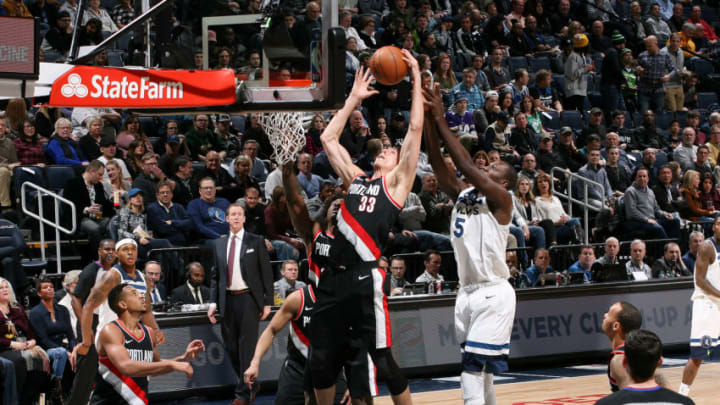Zach Collins is taking positive steps in Portland

On Oct. 20, Zach Collins debuted as a Portland Trail Blazer. He played 7 minutes, went 0-of-4 from the field, and finished with a Game Score of -3.2. He played in just seven of the Blazers’ first 23 games. He hit his first shot on Nov. 13, and didn’t play more than 10 minutes during that stretch. Through nearly a quarter of the NBA season, it looked like the Blazers whiffed by taking Zach Collins No. 10 in the 2017 Draft.
But suddenly, everything changed. Collins went from getting DNP-CDs to an established spot in Portland’s rotation, seemingly overnight. After getting three minutes in Portland’s Dec. 5 loss to Washington, Collins earned 19 minutes in a loss to Houston four days later, and he’s picked up 20 minutes per game in the past six games, including the Rockets game. Last night, he played 21 minutes in a 108-107 loss to the Timberwolves, with seven points and five rebounds in the effort. While it didn’t serve as any sort of referendum on Collins’s play, the symbolism of this recent trend was made clear — Noah Vonleh, fell out of the rotation completely, earning a DNP-CD in lieu of Collins’s minutes bump.
So what changed to give Collins this sudden push into the rotation? Part of it comes down to style of play. Vonleh offers some energy and length to be able to switch pick-and-rolls up top, but he’s a non-shooter and still is a poor decision-maker on both ends. This limits his effectiveness, especially next to two other non-shooting centers in Jusuf Nurkic and Ed Davis. The numbers weren’t terrible for Vonleh overall, but Portland has struggled to find effective minutes for him outside of playing him with the starters (+3.3 net rating in 96 minutes). He fell out of the rotation in part because his contributions to bench units were minimal, and once Al-Farouq Aminu came back from injury and took his starting spot, not much has been working with him on the floor.
At the same time, Collins has started to figure some things out. He’s not suddenly on par with Jayson Tatum or anything, but his minutes have been very good over this six-game stretch. Small sample size, obviously, but since the minutes hike, the Blazers have outscored opponents by 5.7 points per 100 possessions with Collins on the floor, compared to being outscored by 8.2 points with him on the bench. He’s had some strong flashes, and it’s highlighted some of the things he’s started to figure out.
For one, Collins brings the same energy Vonleh does on the glass and on defense. One of his most projectible skills from his lone year at Gonzaga was his mobility, and that’s manifested well on the glass, where he uses his springy vertical athleticism and reach to maneuver around and over opponents on the boards.
He’s also shown a willingness to chase off screens, and while he’s still not great at containing, he can at least recover to bother opponent shots.
Collins also offers more range than Vonleh on offense, which likely helped fuel his movement into the rotation. Despite taking only 21 3s in college, Collins has made extending his range an early fixation of his development, and his threat from the left corner could develop into something substantial.
Collins is beginning to carve out an established role off the bench using these simple skills. But he didn’t just suddenly figure these skills out between Dec. 5 and Dec. 9. Instead, it’s been a combination of opportunity and comfort level with the NBA game that’s allowed Collins to finally demonstrate it. In early minutes this season, Collins struggled with one of the hardest parts of the transition from college to the pros — feel for the game. NBA rookies often struggle with “the moment,” getting sped up too easily or struggling to understand time and situation with a new shot clock and faster pace. Collins had a particularly difficult time with this at first.
But nine games after this ill-advised shot, Collins is showing the ability to make plays like this more regularly.
Collins presents support for a constant truth about rookies in the NBA — that a young player struggling early on in their rookie year is almost never a death sentence by itself. Struggles can come from a variety of places early on. The speed of the game could be too much for you at first. Maybe you don’t have the strength yet to handle NBA bigs. Maybe there’s a logjam at your position. Potentially the move to a new city is a little harder than anticipated (It’s not New York, but Portland is very different from Collins’s hometown of Las Vegas, or a small Catholic college in Spokane, Washington). A multitude of complications can affect a rookie’s transition into the NBA, and it’s important to remember that play on the court isn’t always indicative of talent level.
Next: The Rockets have a counter for everything
Through a month of the season, Collins looked like a bust in the making. Through two months, he’s earned a rotation spot. He’s a great example of why you should hold judgment on rookies in the NBA, especially before the calendar flips to the new year. There are a number of reasons for early struggles, and they can hit anyone, even players who looked like future stars in college. Collins was a top-ten pick for a reason, and now that he is settling into his new career, he’s starting to play like it.